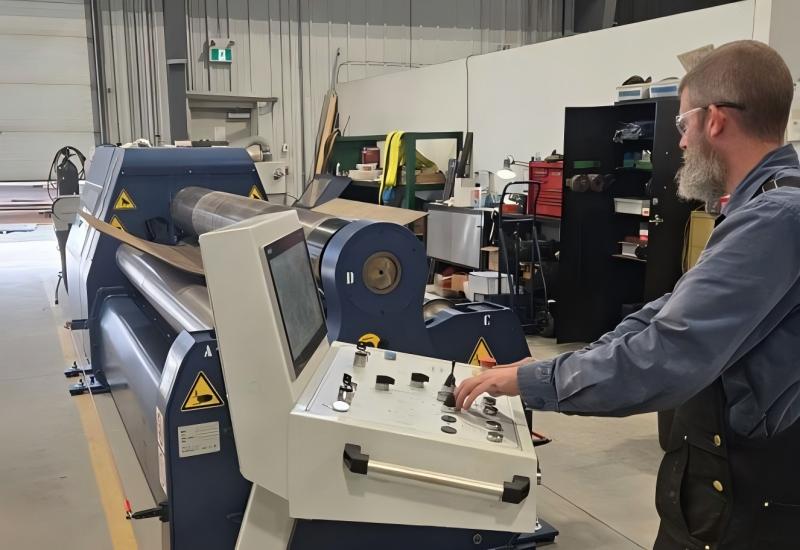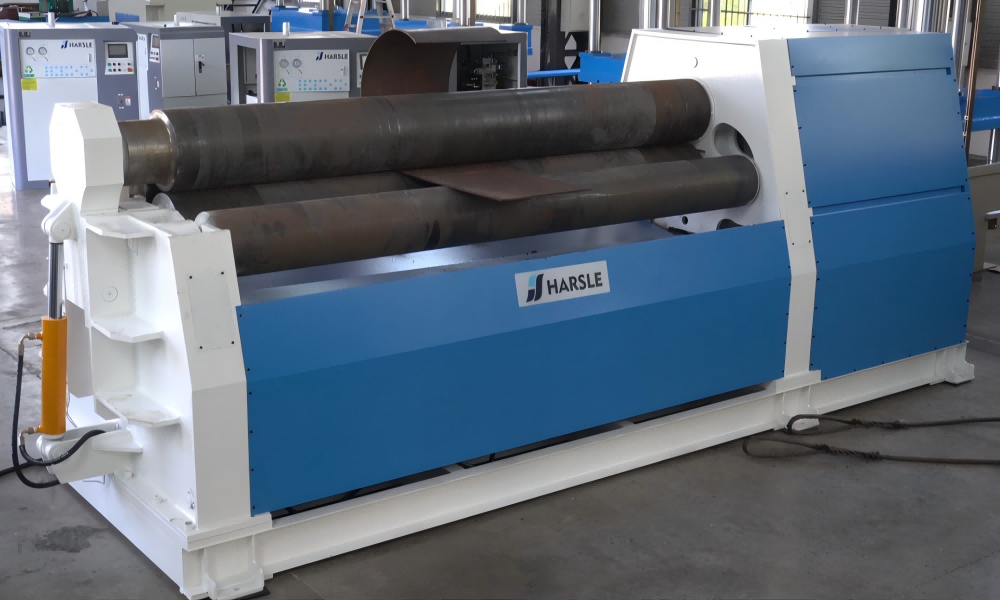Centrum dokumentacji
Kompleksowe instrukcje techniczne i przewodniki, które pomogą Ci opanować obsługę maszyn HARSLE i zoptymalizować wydajność obróbki metali
Jakie umiejętności muszą posiadać operatorzy maszyn walcowniczych?
Zatrudniając lub szkoląc operatorów walcarek, zawsze podkreślam konkretne umiejętności niezbędne do bezpiecznej i efektywnej obsługi skomplikowanych maszyn. Jeśli rozważasz karierę w obróbce metali lub chcesz zwiększyć kompetencje swojego zespołu, zrozumienie, co wyróżnia doskonałych operatorów walcarek, jest kluczowe. W tym artykule jasno opiszę niezbędne umiejętności, wymagania szkoleniowe i najlepsze praktyki dla operatorów, aby zwiększyć wydajność, zapewnić bezpieczeństwo i wysoką jakość operacji formowania metali.
Kluczowe umiejętności techniczne operatorów maszyn walcowniczych
Zrozumienie działania maszyn

Operatorzy muszą dogłębnie znać różne maszyny walcownicze, w tym modele 3-walcowe, 4-walcowe oraz o zmiennej geometrii. Znajomość elementów sterujących, ustawień i możliwości operacyjnych każdej maszyny zapewnia sprawną obsługę i precyzyjne formowanie metalu. Operatorzy powinni umieć dobrać odpowiednie prędkości i posuwy, aby dopasować je do rodzaju i grubości materiału.
Precyzyjne techniki pomiaru i regulacji
Opanowanie precyzyjnych pomiarów jest kluczowe. Zawsze radzę operatorom, aby biegle posługiwali się suwmiarkami, mikrometrami i sprawdzianami, zapewniając, że blachy spełniają rygorystyczne wymagania dotyczące tolerancji. Doświadczeni operatorzy potrafią również dokonywać precyzyjnych, stopniowych korekt ustawień maszyny, zapewniając stałą jakość walcowania w całym cyklu produkcyjnym.
Rozwiązywanie typowych problemów
Operatorzy maszyn walcowniczych muszą szybko diagnozować i rozwiązywać typowe problemy operacyjne, takie jak niewspółosiowość rolek, nierównomierne wyginanie czy drgania maszyny. Rozpoznawanie wczesnych sygnałów ostrzegawczych i zrozumienie, jak wdrożyć szybkie działania naprawcze, może zapobiec przestojom i kosztownym zakłóceniom w produkcji.
Umiejętności w zakresie bezpieczeństwa i konserwacji

Wdrażanie protokołów bezpieczeństwa
Umiejętności bezpieczeństwa są nie do podważenia dla operatorów maszyn przejezdnych. Odpowiednie szkolenie obejmuje znajomość procedur awaryjnego zatrzymywania, prawidłowe stosowanie środków ochrony indywidualnej (PPE) oraz praktyki zabezpieczania maszyn. Operatorzy muszą regularnie przeprowadzać kontrole bezpieczeństwa i rozumieć potencjalne zagrożenia związane z obsługą ciężkich maszyn.
Regularny Konserwacja maszyn
Rutynowe umiejętności konserwacyjne wydłużają żywotność i wydajność maszyn. Operatorzy powinni regularnie sprawdzać zużycie maszyn, smarować podzespoły i niezwłocznie zgłaszać wszelkie nieprawidłowości. Takie podejście zapobiegawcze znacznie zmniejsza prawdopodobieństwo awarii i kosztownych napraw.
Umiejętności miękkie niezbędne dla operatorów maszyn walcowniczych

Dbałość o szczegóły
Biorąc pod uwagę precyzję wymaganą przy walcowaniu metali, dbałość o szczegóły jest kluczowa. Operatorzy muszą uważnie monitorować procesy i ściśle przestrzegać specyfikacji, ponieważ nawet drobne odchylenia mogą wpłynąć na jakość produktu i prowadzić do strat materiałowych.
Skuteczna komunikacja
Operatorzy często ściśle współpracują z innymi technikami i przełożonymi. Jasna komunikacja problemów technicznych, informacji o postępach prac i sugestii usprawnień zapewnia spójne środowisko pracy i zwiększa wydajność operacyjną.
Adaptowalność i ciągła nauka
W związku z ciągłym postępem technologicznym w branży obróbki metali, operatorzy muszą być elastyczni. Gotowość do ciągłego szkolenia pomaga operatorom być na bieżąco z nowymi technikami, udoskonalaniem sprzętu i zmieniającymi się normami bezpieczeństwa.
Programy szkoleniowe dla Operatorzy maszyn walcowniczych

Podstawowe szkolenie operatora
Szkolenie wstępne obejmuje podstawową wiedzę operacyjną, przepisy bezpieczeństwa oraz podstawowe rozwiązywanie problemów. Operatorzy zapoznają się z elementami sterowania, rutynowymi operacjami i reagowaniem w sytuacjach awaryjnych, co zapewnia bezpieczną, początkową interakcję z maszynami.
Zaawansowane programy certyfikacyjne
Polecam zaawansowane programy certyfikacyjne dla operatorów poszukujących specjalizacji. Programy te dogłębnie analizują diagnostykę maszyn, skomplikowane procesy formowania, zaawansowane procedury transportu materiałów oraz procedury konserwacyjne, zwiększając kompetencje operatora.
Często zadawane pytania
Jakie certyfikaty powinni posiadać operatorzy maszyn walcowniczych?
Operatorzy powinni ukończyć akredytowane programy certyfikacyjne w zakresie obróbki metali, kładące nacisk na obsługę maszyn, protokoły bezpieczeństwa i środki kontroli jakości.
W jaki sposób operatorzy mogą poprawić dokładność pracy maszyny walcowniczej?
Operatorzy mogą zwiększyć dokładność poprzez rutynową kalibrację maszyn, dbanie o prawidłowe ustawienie i regularne stosowanie precyzyjnych narzędzi pomiarowych.
Jaki sprzęt bezpieczeństwa jest niezbędny dla operatorów maszyn walcowniczych?
Do podstawowego sprzętu bezpieczeństwa zaliczają się okulary ochronne, ochronniki słuchu, rękawice, obuwie ze stalowymi noskami i odpowiednia odzież redukująca ryzyko podczas pracy.
Jak często należy poddawać maszyny walcowe konserwacji?
Regularne przeglądy zapobiegawcze powinny odbywać się co tydzień, natomiast kompleksowe kontrole i serwisowanie zalecane są raz na kwartał lub zgodnie z wytycznymi producenta.
Wniosek
Stać się skutecznym maszyna do walcowania Operator wymaga zarówno wiedzy technicznej, jak i dobrze rozwiniętych umiejętności interpersonalnych. Dzięki zrozumieniu kluczowych operacji, zapewnieniu protokołów bezpieczeństwa, dbałości o szczegóły i ciągłemu uczeniu się, operatorzy znacząco poprawiają swoją produktywność i bezpieczeństwo w miejscu pracy. Jeśli jesteś zainteresowany zaawansowanym szkoleniem lub potrzebujesz dodatkowych informacji na temat optymalizacji pracy maszyny do walcowania, skontaktuj się z naszym zespołem ekspertów, aby uzyskać spersonalizowaną pomoc.













